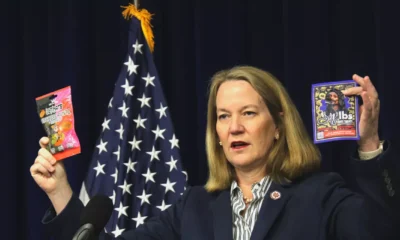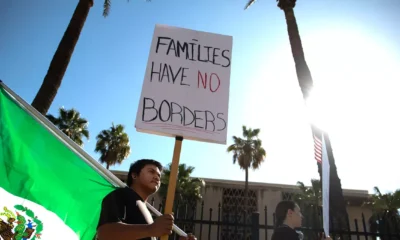budget
Arizona’s Disability Services Secure Funding—But for How Long?

Grace Hayley, advocating for continued disability funding for her twin brother Caleb, expressed gratitude to House Majority Whip Julie Willoughby and Assistant House Minority Leader Nancy Gutierrez on April 30, 2025. They were instrumental in preserving vital financial support. Also present were Jason Snead from the Arizona Developmental Disability Planning Council and Brandi Coon, a parent of a child with a disability. (Howard Fischer / Capitol Media Services)
On April 30, Governor Katie Hobbs announced a new funding deal aimed at sustaining vital disability services. This agreement secures $122 million, averting imminent service cuts. However, the governor cautioned that discussions on the budget for the upcoming fiscal year are still pending, raising concerns about future funding stability.
During a ceremony with affected families, Hobbs emphasized the bipartisan effort in crafting the deal, thanking both party leaders for their collaboration. She acknowledged, however, that despite this progress, there is much work left to ensure continued funding beyond June 30.
Hobbs indicated awareness of economic forecasts suggesting a potential shortfall in anticipated revenues. “I don’t have all the answers right now,” she remarked, committing to advocate for a budget aligned with the priorities of Arizonans.
The funding deal includes crucial support for the Parents as Paid Caregivers program. Originally established during the COVID-19 pandemic, this initiative arose from parents struggling to secure necessary assistance for children with developmental disabilities. Initially funded through Medicaid, federal support ceased last year, prompting the state to intervene financially, a move that sparked debate among lawmakers.
The state’s contribution proved insufficient to meet the current year’s budget needs, leading to further complications. The governor credited Willoughby and Gutierrez for devising a plan that secured the necessary dollars. In return, she accepted restrictions limiting the ability of the governor and state agencies to pursue new federal funding without legislative consent.
Looking ahead, the future of disability funding remains uncertain post-June 30. Hobbs reaffirmed her commitment to prioritizing this funding in ongoing budget negotiations. “It absolutely is a priority to protect this funding in the ongoing budget,” she stated, emphasizing this issue will remain central to discussions.


















